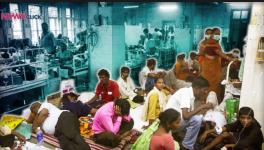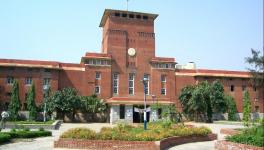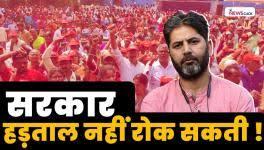WTO/GATS Plans to Make Education a Tradable Commodity: What’s Next?
Newsclick interviewed Nandita Narain, President FEDCUTA and Shehla Rashid, JNUSU on the #OccupyUGC movement and the WTO/GATS summit. Rashid explains that the #OccupyUGC movement is a byproduct of the government’s larger agenda of the privatisation of education and the cutting of funds. In addition to that the government is encroaching the spheres of learning by ideologically motivated appointments. Narain extends it further to explain how the cutting of funds and the dismantling of public universities is done to provide benefit to the corporate houses. She explains that under the WTO/GATS agreement, education will be made a tradable commodity, opened as a market for profit making. Narain links it to the economic recession in 2008 and explains the process of the creation of this market. The commodification of education, the WTO summit and structuring of education as a tradable community has a larger agenda of dismantling the public universities. At the end Narain talks about the resistance that is going on and future plan of action.

Rough Transcript:
Pranjal - Hello and welcome to Newsclick. Recently we have seen a moment called occupy UGC which was against the cut in non-NET fellowship. Today to discuss the issue, also the privitisation of education, the Occupy-UGC movement, and the WTO GATT summit is going to take place in December, we have with us Nandita Narain, who is the President of Delhi University Teachers' Association and FEDCUTA and also Shehla Rasheed, JNU-SU Vice President.
Shehla, start from you, what is this occupy UGC movement? which the JNU-SU has called for and the entire students community is sitting at the gate of the UGC?
Shehla - I would describe this is a spontaneous outburst of students against primarily the cut in non-NET fellowships but also against the way in which this government is proceeding and changing laws - you know try to subvert the constitution, trying to push forward undemocratic moves like ordinance, etc. So I think, what is this movement really is against the high-handedness of the government. And the primary issue is against non-NET fellowship, that is very real issue for many marginalised students; comes from poor background or simply women, who may be from well off family but their family may not be allowing them to do research and it is really a question of life and death; whether they will be carry on research or not. But at this same time, every protesters who are there, be a BA to PHD, they understand that, this is not only about non-NET fellowship alone. This is going to get worse. The entire education system is going to subverted. The higher education especially, the public funded institutions; and that every protester realise very well. And WTO has become very popular issue.
P - Nandita, come to you. When we talk about WTO GATT, as far as I remember, the Delhi University Teachers Association has been raising this point not in 2015 but long back 2013 when the entire process of semesterisation FYUP started. So can you through some light on this entire WTO-GATT agreement that is going to take place in Nairobi?
Nandita Narain - Well, actually we have been raising issues not directly related with WTO earlier. I think teachers are realising slowly why the kind of destruction we have seen in the last five years particularly, in our university and other sister universities. Why it is taking place? First, we thought that may be the government has gone mad or something because why should they destroy the quality of higher education? Why should they want to keep teachers out of decision making, cause making, deciding examination schemes? Why do they want sharp deterioration in quality which is taken place in five years? Then we realised that this is happening because certain pattern. And this is not new and it is going for some time and you declare higher education and non-merit code and then through it open to the market forces. Government keeps pulling back funding from higher education, which they were doing continuously. Now it is merely some 0.36% percentage has gone down sharply. Because GDP is gone up but the grant that is given is coming down in absolute terms. So the minimum commitment that any reasonable country gives 6% for total education and substantial percentage within that for higher education, that is being going down consistently. Both government has done it. The other thing we realised is that, since 2005, why do they want to cut down the fund so much? Whether that is a non-NET scholarship, that is a research or whether grant to colleges which is private trust colleges and universities where they have announced 5% cut. And they have not filled up any posts across the country. Lakhs of posts are lying as vacant. That is why they are cutting back on funding. In Delhi University, about 4500 teachers are ad-hoc, that is about half the number of teachers are ad-hoc. They have not given us our promotions. Some excuse or other, they deny our promotions, they are denying pension. Wherever they can save money, they are saving money. All these things are linked to quality and they linked to cutting back on funds overall. Why they are doing that? When we did some research and found out, that in 2005, the government had actually given commitment to the WTO that higher education will be offered as a commercial, tradable service to the general agreement on trade and services. In the name of opening up free access and trade, something as vital as higher education which should be accessible to reasonable number of Indians, that is you know certain percentage; right now it is abysmally low, is being handed over on a plater to global private forces who will then use it only for profit making and to for controlling what is taught, who is taught and how it is taught and thereby, because of the goal of profit making, the content of the courses offered will change, fundamental courses, languages, pure science and all will be given short-shifts, and only marketable courses will prevail. And secondly, number of teachers will be cut down drastically because teachers are expensive and we will be replaced by online education. So the bulk of Indians have to be happy with the online education because the other alternative, which there you can see private universities like Ashoka and others who can shell out 35 lakhs in 3 years. I mean that is just a minimum, it will go into much higher numbers when there is no competition from public funded university. So what they are going to do in the WTO is that, they made this offer and the last round of Doha round table conference, which has been held in Nairobi in December, they have to fulfill that commitment by signing the deal or even they don't sign, if they don't take the offer back, it becomes a commitment and perpetuity. And the most dangerous clause there is, out 160 countries of signatories, if anyone of them or any public or private player comes from them to set-up their shops in India, then the Indian government has to give everybody a level playing field; which means that, if they don't get the same grant as the Indian Universities get. Like we get 95% grant otherwise we can't survive. Thats why students fees are still reasonable. But if they don't get the same grant, they we don't get either because it has to be level playing field. That is whey to meet that road map; they were set-out to meet, they have been destroying our educational structure, crushing the unions so that there is a voice of dissent is curbed and destroying the quality because only if you destroy the quality then people will leave government university and go to private university, which is still not happening.
P - When we look at the history of Delhi university itself, we look at FYUP, then we see a replica of it, in terms of CBCS. So this process has started long back. The public universities to be made laboratory for a private firm. So can you comment something on that? What call this FYUP then CBCS and how the cut in this expenditure leading to not only making profit for big corporate houses but dismantling the education system as a whole?
Nandita - Yes, it is in around 2008, at the time of financial crisis in the West, there was a desperation because there also the government which was falling pray to control the big corporate houses. They bailed out the big banks which was actually responsible for the finacial crisis and pass the entire burden on people of the countries. So they cut-back in the name of austerity measures, health and education. There were 30-40% cuts in grant to universities and colleges and they had to then go to private players to takeover the institutions. Thereby the whole nature of the education being given has undergone a radical change even the countries like USA and so on. They needed that opening up of trade because their government cannot raise the fees beyond a point because of local politics addressed. So they have to then explore the market across the world and what better market, then the huge country where they told that such a large population that you will be able to generate that kind of profit from there provided the government of those countries open it up for you. So these bills came-up at that time. Let me tell you that, Kapil Sibal was one of the - according to Wikileaks - most favoured minister for the US, and people have been placed in the places of power where they can take decisions which only will be contuse to the interest, not of their own country but whoever the big players are. So at that time, this National Knowledge Commission was set-up and even before that happened, there was this move to introduce a structure which will be conducive to the coming of US universities. It was not Europe oriented but US oriented. So you find a four year semester system and whole thing of cafeteria approach. Despite the fact that we had a different school system here. Since we have to tie-up with the US universities and have join-degree program with them, and because of trade opening up, we needed cheap labour for those multi-national which are going to come. You did not need thinking population, which will be questioning everything. You need people who could do multi-tasks, not with very good intellectual skills. So they committed themselves to opening large number of community colleges, which are the lowest trunk in their own country. And what this government started doing is to convert degree colleges into community colleges. It is started in Delhi University. So everything was being dictated from outside. And simultaneously the attack was coming through the WTO, that you will have to keep producing fund such a manner, that ultimately become zero so you can sign the deal in 2015 in the last round. So this is we found the first attack was in the semester system which did not suit university like ours which is a federal university which is 80+ colleges and a centralised exam been held twice a year was absolute disaster. It is destroying the quality of teaching and learning completely. And the entire examination system has been become fast, you can't handle it. It is too large number. The entire open learning in our university has been hit because school of open learning; corresponding courses which is about 5 lakh students, their degrees were devalued because they are going by the annual system and we have the three year semester system. Subsequently, hardly a couple of years not even a review of what it happened after the semester, they brought in the four year program, which was absolute disaster. How they systematically crush the Sem. They destroyed any kind of interaction with Union, they attacked teachers in various voice, dissenting voices in various ways to have a rain of terror. So that all voices of opposition has silenced. That was roll back. Because change in government but the same government rolled it back has brought-in the exactly the same thing. Because the FYUP was one particular manifestation of the choice based credit system. Choice Based Credit transfer and Semester System is the full name. The essence of the whole thing is the credit transfer. The CBCS is actually a public-private partnership scheme.
P - Shehla, I would like to come to you on this point. When we talk about the private people taking the public funded universities, which obviously lead to high fee structures. So don't you think it will widen the social inequality hat we have already in the society?
Shehla - That of course we have seen at the primary school level. This is the question that we have to ask. If the best people go for government jobs, everyone desperate for government jobs, then how is the government schools don't function well and private school function better? And this is what Nandita was referring to. This is already been experimented successfully at school level. Now they are going for higher education I think primarily for one reason, which Nandita also hinted that, we are asking questions. If you look at the voices of protest against this government, the voices of protest coming from the writers, from academicians, from artists. And these are exactly the spaces that they want an intellectually dwarf population which doesn't ask questions and this is like too large politics. I am sure that people have pointed out this before. When you cannot afford private education, then you take loan and you will not loan for sociology or philosophy. Its only go for engineering or MBA course. To repay that loan, you will need to be in that corporate slavery, you need to identify a job, which is again an inhuman terms. I mean, if you look at the bonds that private companies make people sign, those are really inhuman.
P - I would like to pose one more thing over here. If you look at the reason behind these wide range protests are being taking place. These are rapid ideological influence that the regime is trying to push over. And this regime is not pushing only in the higher education or primary education but even in the public spheres. So from the students community, what do you think the threat that we face as a student and as a person living in the society?
Shehla - Both are related. I mean, rights as students that is one thing but your rights as students also guaranteed only when your rights as citizen are guaranteed. Now the problem here is, there are so many problems in the education system. If you start counting, we loose track of how much is to be done. If you look at Delhi university, if any one has a dream of reforming that university, they will realise how bad it has become. So all of this minor fixes we feel are not going to work anymore. There has to be a bigger level or macro level push back. I see hope in this Occupy-UGC movement to become that voice of protest because after a very long time, on the question of education, people are getting mobilised. Privatisation has become a quick fix for everything. If anything goes wrong, privatisation. But now, after two decades of study on privatisation, students are actually spontaneously coming out against it. That is the ray of hope.
P - Come back to the Occupy-UGC movement and protests, protesters march to MHRD and the minister was forced to come out and talked to students. What was the outcome and what is the way ahead?
Shehla - All the statement that MHRD has given - three statements so far, Smriti Irani herself come out - all of this actually to destabilise the movement.Now what is my take on it. I think initially they thought, ABVP took out victory rallies in Allahabad University, in JNU saying that the issue has been resolved. Smriti Irani has been constantly saying that, it is not going to be discontinued. But our question is, if these are not going to be discontinued, what is that committee for? what is that committee would be doing? The whole project of that committee is to restrict the fellowships by merit, by income or whatever the fraud logic they come-up with. And our whole project is about expansion and enhancement. Expansion to state universities and enhancement in the amount. The role of Smriti Irani and MHRD so far is to demobilise students.
Nandita - I want to continue in that thread that, see the occupy UGC movement is not about the UGC at all. The UGC did not take any decision independently. I mean that is very clear. This is the policy of the government of India. It is not just non-NET scholarship which is affected, research. Research has been affected. You are going to sign some agreement which your Intellectual Property rights are going to be taken away. Look at the clauses in that; Intellectual Property rights are taken away, your education service sector taken over completely, your health sector has been taken over completely, your drinking water sector has been taken over, your all quality of life; I mean when you talk about inequality, it is not just quality of inequality but it is a question of able to survive. We have our 99% of our population be able to survive. It is question of utter misery. The question of bonded labor, having to pay back the loans and you can't pay back loans. You have already so many people to committing suicide, that number will go tremendously. You already have parents selling their kidneys to pay for the children's education. They will sell their land, they will sell all the assets. How will the country live and for whom? 1% of rapacious world population the whole country has to be held hosted because some people has betrayed us continuously for their own personal greed. And other small agendas are signed our freedom away to the East Indian Company, which has got a new name WTO. And I want to make one more point here, I mean the Occupy-UGC movement is therefore, a much larger movement. I want to make one parallel example, this is happening all over the world. If you are look at foreign model, which we don't have to but if we do why do we look at Finland, which has an education policy? They have free education from KG to PG. Latin American countries. They invest heavily in this because the human beings are the biggest resources in the country. Therefore to empower and enrich them, to make their potential viable, it is worthwhile in investment and money is not your grandfather's money. It is the money of the people of India who paid the taxes, even the poorest of poor are paying taxes.
P - I think let us end here on the positive note that only response to all these things is the struggle that we can do in the streets. Thank you for giving us your time.
DISCLAIMER: Please note that transcripts for Newsclick are typed from a recording of the program. Newsclick cannot guarantee their complete accuracy.
Get the latest reports & analysis with people's perspective on Protests, movements & deep analytical videos, discussions of the current affairs in your Telegram app. Subscribe to NewsClick's Telegram channel & get Real-Time updates on stories, as they get published on our website.
























